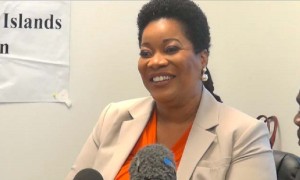Independent writer
A Tale of Being Marginalised in One’s Own Country
Published
4 months agoon

An Open Letter to the Governor of the Turks and Caicos Islands and the Turks and Caicos Islands Integrity Commission
By: Sabrina Elizabeth Green
Founder, ProLingo Solutions.
I struggled for days contemplating whether or not I should write this article. I told myself to let it go, to move on quietly, as so many of us are expected to do when the system fails us.
In speaking out we often fear ridicule, victimization, being labelled as troublemakers or even worst, blackballed all together for simply standing up for what is right. Finally, after considerable deliberation, I was lead to do so.
Silence feeds injustice, and if we, as Turks and Caicos Islanders, do not speak up when wronged, then the cycle of exclusion continues unchallenged.
This is not about my personal disappointment, I am merely an illustration of a forgotten people, whose dignity has been traded for progress; this is about us all, the unfairness, unethical conduct, and the growing pattern of marginalisation faced by qualified Turks and Caicos Islanders in their own country, by institutions that should embody integrity.
For over three decades, I have served the Turks and Caicos Islands as an interpreter in both Spanish and Haitian Creole. From the age of seventeen, I have helped bridge linguistic and cultural divides in our communities and public institutions so that justice could be fairly administered.
With years of experience and formal qualifications, I founded ProLingo Solutions, a homegrown company created to professionalise and streamline interpretation/translation services across the Turks and Caicos Islands.
The goal was simple: to ensure that translators and interpreters throughout the islands are certified to international standards, and that both public and private entities could access qualified, competent, and trained professionals through a transparent and efficient local system that provided language services for most languages. Where deficiencies in domestic capacity existed, services would be provided by an international sub-contractor through ProLingo Solutions.
In April 2025, I mentioned this business venture to the Registrar of the Supreme Court, hoping to work with the court system again. He appeared enthusiastic. He admitted that the courts were overwhelmed with cases involving non-English speakers and the challenges in sourcing interpreters in a timely manner, he said my proposal was exactly what the Judiciary needed.
At his request, I submitted the full written proposal, including rate structure, staffing plans, and training models. I had every reason to believe the matter would advance.
Then came silence. Despite numerous calls and emails, I received no response, not even an acknowledgement of receipt for the proposal sent. Finally, after contacting him via Whatsapp, he replied to my request for an update, by stating that he would forward the proposal to the Chief Justice for discussion.
On October 9th, 2025, after six months of waiting for a response, I sought an audience with the Hon. Chief Justice. I was successful in obtaining an appointment with her and the meeting was scheduled for 10:00am on October 15th. The Registrar was also present at this meeting. Upon learning that my proposal had never reached her, the Chief Justice expressed concern and admonished the Registrar in my presence, then instructed him to apologise to me for “dropping the ball.”
Her Ladyship was otherwise gracious and very encouraging. She requested a detailed rate breakdown by day, week, month and the annual costings for services, and even spoke of piloting the service within the Judiciary once in receipt of the rate schedule. I left the meeting hopeful.
The requested information was sent to the Registrar immediately and I began rallying up my interpreters for the anticipated trial run.
But once again, only silence followed.
Days after the meeting, I was reliably informed that allegedly, the entire meeting, including the apology, may have been nothing more than a performance. It was alleged that there was never any genuine intention to engage a Turks and Caicos Islander for this service and that certain individuals within the Judiciary generally preferred to contract from outside the country. Disbelief swept over me.
“Could it be possible that my request for that meeting was accepted solely for the purposes of checking a box?”
If true, this is both disheartening and deeply troubling.
On Monday, November 3rd, 2025, I received an email from the Registrar, written “on the direction of the Chief Justice.” It stated that my company was unsuccessful due to “budgetary constraints” and proceeding with ProLingo Solutions would require the Judiciary to go through an “Invitation for Tender Process.”
That explanation, however, raises serious questions. If procurement rules were truly the obstacle, why was I not guided on how to participate or reapply? Especially after my proposal offered alternative methods of engagement. Further, what is wrong with going through the tender process? And allegedly, why has another company, one that mirrors my proposal, been contracted for the same service without facing those same restrictions?
It is further alleged that this new company, reportedly based in the United States, is unlicensed and untaxed in the Turks and Caicos Islands yet is scheduled to begin Judiciary work on November 7th, 2025, via Zoom. It is also alleged that the Registrar maintains close personal ties with individuals associated with this company and that financial incentives may be involved.
These are all allegations, but they deserve serious scrutiny.
Is it not curious though, that the Judiciary, which has long adhered to an established system for managing its translation needs, chose now to depart from that practice only after receiving my proposal, and is now opting instead to engage a foreign entity to carry out the very initiative I had proposed?
“Please bear in mind that this is not about who was hired; it is about how the process unfolded. When local professionals are silenced, overlooked, and their intellectual property appears to be used without acknowledgment, it undermines the very values that justice stands for.”
My proposal, the product of years of professional experience and development, was submitted in confidence. It outlined not only financial models but also training and certification systems unique to ProLingo Solutions.
If it is true that this information was used to structure the foreign company’s operations, it raises serious concerns under intellectual property and administrative law. Whether through negligence or intent, such actions damage trust and erode public confidence in the Judiciary’s commitment to fairness.
Here is the bigger picture though – Beyond this single event lies a broader and more unsettling truth; the growing climate of fear and exclusion within our country. Many Turks and Caicos Islanders no longer feel represented or protected, and our duly elected government appears paralysed into inaction. Those without the “right connections” are too often left to navigate a system that seems to reward silence and punish self-reliance, forcing capable citizens to stand on their own and fend for themselves in the very land they call home.
Integrity, it seems, is demanded only of locals. Time and time again, we hear of the allegations where some foreign workers have engaged in questionable dealings or practices and yet appear to walk away unscathed, while Turks and Caicos Islanders on the other hand, are often the ones dragged through the justice system, humiliated, and made to feel unworthy in their own land after their characthers have been assassinated.
I am fully aware that by speaking out, I may be targeted, but I stand by what is right, and that is what matters most to me, besides, I am quite capable and confident enough to stand on my own, but I shouldn’t have to.
Please know that this is not an attack on anyone’s nationality or origin; it is a cry for fairness and equity in a country that is forgetting its own. I did not learn to speak foreign languages by accident, but because I believe in understanding and connection across cultures and an overall genuine love for all people. I am smart enough to recognise that foreign expertise are sometimes necessary where local capacity is limited; however, that reality should never come at the expense of qualified and compotent Turks and Caicos Islanders who are deserving of the opportunity to contribute meaningfully to their country’s growth and development.
This environment has created silence, a silence that stifles innovation, crushes ambition, and erodes the national spirit.
But all is not lost, now is the time for us to stand as one, to look out for each other as though our very lives depended on it; because they do. We must take the lead in demonstrating how we care for one another, so that those who live and work among us will be guided by the same example. It is my considered view that had the Registrar, even for a moment, believed that I was supported or properly represented within my own country, there might have been no need at all for me to write this article.
Turks and Caicos, our dignity and our children’s futures depend on our ability to stand in the face of wrong and call it what it is. Do not be deceived, we are good enough; in fact, in many cases, we are better; I implore you to not give up, but stand up for what is just.
If we cannot demand a fair opportunity in our own country, then tell me, where can we be expected to demand one?
What happened to me is not unique. It reflects a growing and painful pattern: many qualified Turks and Caicos Islanders are continuously passed over for contracts, and positions that should rightfully build local capacity. We are told to study, to work hard, to invest in our communities, yet when we do, our innovation is quietly repackaged and our ideas outsourced.
This is not progress; it is silent displacement.
I now respectfully call upon Her Excellency the Governor, the Turks and Caicos Islands Integrity Commission, and all relevant oversight authorities to investigate this matter fully. This appeal is not about bitterness; it is about fairness.
If processes are being manipulated, if intellectual property is being used without permission, if foreign entities are being granted preferential treatment outside of domestic procurement and licensing standards, and where foreign workers are given opportunities over interested, qualified and competent Turks and Caicos Islanders, then these actions must be addressed.
Accountability is not hostility; it is the foundation of justice.
“Fear cannot build a nation. What builds a nation is transparency, fairness, and the courage to confront uncomfortable truths.”
Again, I really did not want to write about this unfortunate incident. Like many others, I have considered the consequences of speaking openly and honestly in a small community where personal relationships often blur the line between duty and discretion. But truth must be spoken and there is no better time than now.
I have spent my life helping this country communicate across language barriers. Today, I am communicating something far more urgent: that the dignity and rights of Turks and Caicos Islanders must be defended.
If this letter brings awareness, sparks reform, or simply reminds those in power that fairness must never be selective, then it will have served its purpose.
We, the people of the Turks and Caicos Islands, are not asking for charity; we are asking for fairness.
We are not asking for privilege; we are asking for equality.
And we are not asking for silence; we are asking for justice.
If someone does not stand up to the atrocities happening around us, they will continue to happen.
So, why not now? Why not me?
Sabrina Elizabeth Green
Translator & Founder, ProLingo Solutions Ltd.
Turks and Caicos Islands
You may like
-


From Service to Significance: Beaches Turks and Caicos Graduates LEAP into Excellence
-


Taylor, Green, Butterfield & Garland announced as Newest PDM Candidates
-


Raising Royalty author hosting generous Event on February 3
-


Grand Turk Prison in Breach of Human Rights Standards, investigation finds
-


TCI HUMAN RIGHTS COMMISSION ON GOVERNMENT COVID-19 POLICIES
-


New Human Rights Commission Director for TCI, Sabrina Green will help you to know your rights
Independent writer
A Turks and Caicos we can all be proud of
Published
1 month agoon
January 15, 2026
What’s on my mind is a Turks and Caicos that deserves to be celebrated, not reshaped into something unrecognizable.
Yes, Providenciales has grown. It has welcomed businesses, ideas, and people from all over the world, and in many ways it reflects the beauty of a melting pot. But growth should not mean erasure. Progress should not require us to trade away the very soul of who we are.
There is a moment we are standing in right now that calls for intention. Stop. Pause. Preserve. Think ahead for the generations to come. All is not lost, but it can be, if we do not choose wisely.
Each Islander is unique to the island they are from. Even our dialogue carries the imprint of where we come from. Our accents, expressions, rhythms, and ways of telling stories quietly reveal our home islands. That is our power. That is our beauty. The true richness of Turks and Caicos lives in its people as much as in its landscapes. Exploring and preserving our islands must also mean exploring and preserving their inhabitants, their knowledge, their traditions, and their ways of life. We are not here to invent something foreign. We are here to shape and mold what we have already been given. God has already provided the blueprint. We only need to slow down long enough to see what is right in front of us.
No one knows your country or your product better than you who have lived it. Why try to be something we are not? Each time we attempt to imitate another place, we lose a piece of our own lifestyle. A lived experience is what gives us the authority to shape our present and our future.
I envision the marketing and development of our family islands not as replicas of somewhere else, but as island treasures. Places where businesses rise from culturally focused initiatives, designed first with residents in mind, and where visitors are welcomed into an authentic haven that reflects what Turks and Caicos truly represents.
North Caicos as a living sanctuary. Lush, green, and respected. A place for nature trails, wildlife exploration, farming traditions, and environmental exhibitions, where development works with the land, not against it.
Middle Caicos safeguarded for its history and natural wonders. Its caves protected not only as attractions, but as classrooms. Its flamingos preserved as symbols of the fragile beauty we are responsible for protecting.
South Caicos honored as the salt and fishing capital. The rhythm of boats, salt ponds, and sea life forming the heart of its identity. A working island where maritime culture and sustainable fishing are supported, celebrated, and passed down.
Grand Turk restored and respected as a cultural and historical anchor. Front Street with its light and British flare revived with intention. The return of a strong public library and cultural spaces for those who adore history, storytelling, and research.
Salt Cay protected in its quiet uniqueness. A picturesque island lifestyle centered on stillness, craftsmanship, heritage, and community.
The heart of this vision is not tourism alone. It is our people.
Celebrate our island cultures. Create small businesses that allow islanders to thrive with dignity, love, and respect. Build economies that sustain us without displacing us. Let development work in service of community, not the other way around.
Teach our youth the trades, the arts, the skills, and the stories while our elders are still here to pass them on. Boat building, straw work, farming, fishing, cooking, music, storytelling, herbal knowledge, construction, and design. These are not relics. They are foundations.
From this, innovation is born. When young people are rooted, they can modernize tradition without losing it. They can bridge yesterday and today. They can create futures that honor the past instead of replacing it.
We do not need to become a concrete jungle to be successful. We do not need to mirror other places to be worthy. We do not need to sacrifice our identity to attract the world.
What we need is the courage to protect what is left, the wisdom to shape what is coming, and the commitment to ensure that being a Turks and Caicos Islander is not just a title, but a living experience our people can still feel, recognize, and pass on.
From Alicia Swann
Turks and Caicos Islander
Independent writer
Who will Dare To Step Forward to Restore Political Balance in the Turks and Caicos Islands?
Published
7 months agoon
August 8, 2025
Ed Forbes
Turks and Caicos, August 8, 2025 – As a columnist, I usually steer away from politics, but I think credit should be given where it’s due. With that being said, respect must be given to any leader who recognizes when it is time to pass the baton. I consider this an act not of retreat, but of wisdom and foresight. The recent announcement of Hon. Edwin Astwood willingness to loosen his grip on the political frontline if need be, is such a moment.
For years, he stood as a formidable voice in opposition, consistently winning his constituency, striving to maintain a necessary balance of power in the Turks and Caicos Islands. But standing nearly alone, one of just two successful opposition candidates, his efforts, though valiant, were always going to be limited by numbers.
Today, the People’s Democratic Movement (PDM), once the pulse of the nation’s democratic process, finds itself at a critical juncture. Who will now have the courage and capacity to step up and lead, to revitalize its mission, and to restore a credible alternative voice in Parliament?
Like a game of chess, the path forward requires thoughtful reflection. It begins with an honest examination of why the opposition has struggled. Was it a matter of disconnected messaging, inadequate grassroots engagement, or a failure to offer fresh, compelling solutions? Perhaps the strategy relied too heavily on legacy narratives rather than adapting to the current political climate.
struggled. Was it a matter of disconnected messaging, inadequate grassroots engagement, or a failure to offer fresh, compelling solutions? Perhaps the strategy relied too heavily on legacy narratives rather than adapting to the current political climate.
Many of the concerns citizens voice in private—whether at family gatherings, domino tables, or barbershops—are not always echoed in public forums such as town hall meetings, political committees or the polls. This silence raises questions: Are we too polite to demand better? Or have we grown too accustomed to the status quo to insist on real change?
Regardless of the cause, it is clear that the opposition must look inward. Rebuilding the party’s credibility and purpose is essential. Whether that means reforming the existing structure or creating a new political movement altogether remains to be seen. What cannot continue is a one-sided political system where dissenting voices are minimal and balance is absent.
The country needs a movement grounded in practical, market-oriented reforms. People are hungry for transformative economic change, change that benefits the wider population, not just the privileged few. Voters want leaders with integrity, bold vision, and the courage to make decisions in the national interest—not merely for corporate or political gain.
The last election results, despite a few hiccups, suggest that the opposition failed to present itself as the party of bold ideas and real solutions.
Any party seeking relevance must speak directly to the growing concerns of inequality—both economic and geographic—that influence how people vote. It must also demonstrate the capacity to effectively manage the growing crime and migration, while embracing integration strategies that reflect our collective identity and demographic realities.
We need leaders who can bring people of all ethnicity together, inspiring unity and shared vision, to work collectively toward a common goal.
It is my belief, the responsibility for change does not lie solely with those in office.
Ultimately, it is up to all of us, as citizens, to demand better, to stay engaged, and to lead by example.
If we wait for leadership to find its moral compass on its own, we may be waiting indefinitely. With the geopolitical challenges around the word, leadership is not for the faint of hearts. At the end of the day, they must follow where the people lead.
Independent writer
British Turned SIPT Corruption Trials in Turks and Caicos into a Costly Farce
Published
7 months agoon
July 18, 2025
Turks and Caicos, July 18, 2025 – It seems like ages ago now, but not so long ago, the people of the Turks and Caicos Islands (TCI) looked to the British with hope. And, unlike his predecessors, former Governor Gordon Wetherell justified that hope. He showed the political courage and moral fortitude to trigger the suspension of the TCI Constitution — ending the “political amorality and immaturity and general administrative incompetence” that prevailed under the local rule of Premier Michael Misick.
Wetherell appointed the 2009 Commission of Inquiry, which laid bare the “endemic corruption” of Misick and his cronies. This led to their removal from power and set in motion the investigations that ultimately resulted in their arrests. TCIslanders hoped that, with both constitutional authority and moral duty, Wetherell’s successors would hold these crooks to account. Alas, things fell apart.
removal from power and set in motion the investigations that ultimately resulted in their arrests. TCIslanders hoped that, with both constitutional authority and moral duty, Wetherell’s successors would hold these crooks to account. Alas, things fell apart.
Simply put, successive governors stood by as the so-called SIPT trials dragged on for more than a decade, costing TCI taxpayers a mercantile $100 million and counting. Frankly, this legal process has proven as dilatory, incompetent, and feckless as the Commission of Inquiry was swift, competent, and damning. It’s as if we’re living the postcolonial follies and venal administrative hijinks V.S. Naipaul skewered in A Bend in the River.
If anyone had told long-suffering TCIslanders at the outset that:
- The British would take more than a decade — and tens of millions of our money — to prosecute Misick and his cronies;
- Most defendants would get off with suspended sentences and court-ordered restitution amounting to only a laughable fraction of what they stole;
We would have said: Don’t bother, man. Spare us the farce, and the bill.
Frankly, justice has not merely been delayed; it has been “drastically” discounted, both literally and figuratively. Of course, Misick and his cronies did what any shameless defendants would: they weaponized every procedural trick, orchestrating endless delays while expert British judges and prosecutors indulged their charade — probably too busy tallying billable hours to notice the sabotage.
We were bewildered and dismayed in equal measure as we watched all defendants make a mockery of the judicial process. I mean, it was like watching a matador tease a blind bull. Yet that paled in comparison with our bewilderment and dismay when Floyd Hall and Clayton Greene were sentenced in October 2023. The TCI’s own Chief Justice declared she was handing down “drastically reduced” sentences because of Hall’s poor health and “significant delays in prosecution.” Their mockery — and the willingness of TCI judges to indulge it — seemed completely lost on her.
Meanwhile, chief crook Misick’s trial concluded recently. Yet, insultingly, the judge is delaying his verdict until October — a timeline that would be untenable in any functioning democracy. Even juries in America routinely hear cases that are far more complex and have no difficulty rendering verdicts within days.
No doubt, everyone expects a guilty verdict. More to the point, after the limp slaps on the wrist for Hall and Greene, everyone expects Misick to get a suspended sentence. After all, with all due respect to the medical profession, why wouldn’t Misick ape Trump by having his doctor declare that (like Hall) he too is in such “poor health” it would be inhumane to make him serve a single day in prison? What’s more, he’ll probably be required to forfeit only a fraction of the hundreds of millions he bragged about looting while premier.
Then, to top it off, everyone expects his automatic appeal to drag out until at least the winter of 2026. Like I said, a complete farce.
Incidentally, former minister Lillian Boyce stands as the moral center of this legal farce. Because she was the only crony with the conscience and integrity to plead guilty, thereby sparing TCIslanders the expense and national embarrassment of a criminal trial.
Boyce’s plea made her a witness for the prosecution whose testimony guaranteed guilty verdicts for any other crony foolish enough to risk trial. Even so, it took five years after the SIPT trials began in December 2015, and 12 years after the Commission of Inquiry’s indictments, for the prosecutors to strike this plea bargain.
That said, it’s arguable that the legions of expatriate judges, “special” prosecutors, and defense lawyers all had vested interests in dragging out these trials. After all, the judges and prosecutors collected exorbitant salaries, while the defense lawyers pocketed hefty legal fees.
Sure, defense lawyers usually rake in the big bucks in criminal cases. But special prosecutor Andrew Mitchell is giving them a run for their money. After all, reports are that he’s still billing the TCI government over £3,000 per day — plus luxury living and travel expenses. No British lawyer ever benefited so handsomely from any criminal case. And this, while the local government struggles to deliver basic public services.
This isn’t just a legal boondoggle; it’s a cynical transfer of wealth from one set of opportunists (our crooked politicians) to another (British hired guns). “Attorneys and investigators in the case are becoming extremely wealthy off the backs of the people of the Turks and Caicos Islands.”
hired guns). “Attorneys and investigators in the case are becoming extremely wealthy off the backs of the people of the Turks and Caicos Islands.”
But the supreme miscarriage of justice is how the British left long-suffering TCIslanders holding the bag for this costly farce. You’d never know it, but the British retained responsibility for good governance through the appointed governor. The point is that their man in Turks and Caicos presided over many of the corrupt practices at issue during these trials. Indeed, that’s why Misick’s infamous defense — that the governor signed off on everything — was more than self-serving; it was an indictment of the constitutional colonialism the British lording over “Overseas Territories” represents.
Thus, the British compounded their failure to deliver justice in these SIPT trials by forcing TCI taxpayers to bear the costs. And this, despite a formal submission to the British government making clear that responsibility for funding these prosecutions belongs to the UK, not the TCI.
That submission echoed arguments I made years earlier: the UK’s own failures of oversight, governance, and administrative responsibility made these prosecutions necessary in the first place. In effect, we’re being robbed twice — first, by Misick and his cronies treating our treasury like their slush fund, and then by the British forcing us to foot the bill for prosecutions designed to fail.
This harkens back to the most insidious form of colonial grift — injustice for us, profits for them. A farce so perverse, even Naipaul would have struggled to satirize it.
Anthony Hall
TRENDING
-

 News1 week ago
News1 week agoThe Department of Trade, Industry & Fair Competition to Host Export Readiness Workshop Under the theme “Empowering TCI Businesses for Local Growth and Global Markets.”
-

 Bahamas News5 days ago
Bahamas News5 days agoTens of Millions Announced – Where is the Development?
-

 Bahamas News4 days ago
Bahamas News4 days agoGroundbreaking for Grand Bahama Aquatic Centre
-

 Caribbean News1 week ago
Caribbean News1 week agoMottley Sworn in After Historic Clean Sweep in Barbados Election
-

 News1 week ago
News1 week agoStrong December Performance Signals Continued Demand for the Turks and Caicos Islands
-

 Health4 days ago
Health4 days agoWhat to Look for with Self-Checks at Home
-

 News1 week ago
News1 week agoMulti-Agency Planning Enforcement Operation Conducted at multiple locations in Providenciales






